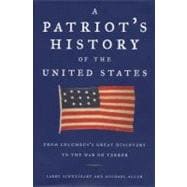
Michael Allen is a professor of history and American studies at the University of Washington, Tacoma.
| ACKNOWLEDGMENTS | vii | ||||
| INTRODUCTION | xi | ||||
| CHAPTER ONE: The City on the Hill, 1492-1707 | 1 | (37) | |||
| CHAPTER TWO: Colonial Adolescence, 1707-63 | 38 | (20) | |||
| CHAPTER THREE: Colonies No More, 1763-83 | 58 | (30) | |||
| CHAPTER FOUR: A Nation of Law, 1776-89 | 88 | (39) | |||
| CHAPTER FIVE: Small Republic, Big Shoulders, 1789-1815 | 127 | (52) | |||
| CHAPTER SIX: The First Era of Big Central Government, 1815-36 | 179 | (40) | |||
| CHAPTER SEVEN: Red Foxes and Bear Flags, 1836-48 | 219 | (30) | |||
| CHAPTER EIGHT: The House Dividing, 1848-60 | 249 | (45) | |||
| CHAPTER NINE: The Crisis of the Union, 1860-65 | 294 | (59) | |||
| CHAPTER TEN: Ideals and Realities of Reconstruction, 1865-76 | 353 | (39) | |||
| CHAPTER ELEVEN: Lighting Out for the Territories, 1861-90 | 392 | (30) | |||
| CHAPTER TWELVE: Sinews of Democracy, 1876-96 | 422 | (35) | |||
| CHAPTER THIRTEEN: "Building Best, Building Greatly," 1896-1912 | 457 | (35) | |||
| CHAPTER FOURTEEN: War, Wilson, and Internationalism, 1912-20 | 492 | (41) | |||
| CHAPTER FIFTEEN: The Roaring Twenties and the Great Crash, 1920-32 | 533 | (25) | |||
| CHAPTER SIXTEEN Enlarging the Public Sector, 1932-40 | 558 | (31) | |||
|
568 | (21) | |||
| CHAPTER SEVENTEEN: Democracy's Finest Hour, 1941-45 | 589 | (22) | |||
| CHAPTER EIGHTEEN: America's "Happy Days," 1946-59 | 611 | (56) | |||
| CHAPTER NINETEEN: The Age of Upheaval, 1960-74 | 667 | (53) | |||
| CHAPTER TWENTY: Retreat and Resurrection, 1974-88 | 720 | ||||
| CHAPTER TWENTY-ONE: The Moral Crossroads, 1989-2000 | 703 | (100) | |||
| CHAPTER TWENTY-TWO: America, World Leader, 2000 and Beyond | 803 | (21) | |||
| CONCLUSION | 824 | (3) | |||
| NOTES | 827 | (70) | |||
| SELECTED READING | 897 | (2) | |||
| INDEX | 899 |
The New copy of this book will include any supplemental materials advertised. Please check the title of the book to determine if it should include any access cards, study guides, lab manuals, CDs, etc.
The Used, Rental and eBook copies of this book are not guaranteed to include any supplemental materials. Typically, only the book itself is included. This is true even if the title states it includes any access cards, study guides, lab manuals, CDs, etc.